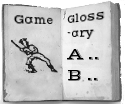German Bat Ball: Difference between revisions
No edit summary |
(Set Game Eras to Derivative) |
||
| (One intermediate revision by the same user not shown) | |||
| Line 2: | Line 2: | ||
|Term=German Bat Ball | |Term=German Bat Ball | ||
|Game Family=Kickball | |Game Family=Kickball | ||
|Description=<p>A 1921 handbook and a 1922 handbook depicts German Bat Ball as a team game that uses a ball like a volleyball and that has neither a bat nor pitching. A | |Description=<p>A 1921 handbook and a 1922 handbook depicts German Bat Ball as a team game that uses a ball like a volleyball and that has neither a bat nor pitching. A “batter” puts the ball in play by serving or “posting” it [as in schoolyard punchball] and then running around a post (Clark) or to a distant safe-haven area (Elmore/O’Shea). A run is scored if the runner can return to the batting base without being plugged. It is unclear whether the runner can opt to stay at the distant base to avoid being put out. A caught fly is an out, and a three-out-side-out rule applies.</p> | ||
|Sources=<p><span>Lydia<span> | |Sources=<p><span>Lydia<span> </span>Clark<span>, </span><em>Physical Training for the Elementary Schools</em><span> (B. H. Sanborn, Chicago, 1921), pages 240-243.</span></span></p> | ||
<p><span>Emily Elmore and M. | <p><span>Emily Elmore and M. O’Shea, </span><em>A Practical Handbook of Games</em><span> </span>(Macmillan, New York, 1922)<span>, pages 36-39.</span></p> | ||
|Game Eras=Derivative | |||
}} | }} | ||
Latest revision as of 08:46, 28 November 2012
| Game | German Bat Ball |
|---|---|
| Game Family | Kickball |
| Location | |
| Regions | |
| Eras | Derivative |
| Invented | |
| Tags | |
| Description | A 1921 handbook and a 1922 handbook depicts German Bat Ball as a team game that uses a ball like a volleyball and that has neither a bat nor pitching. A “batter” puts the ball in play by serving or “posting” it [as in schoolyard punchball] and then running around a post (Clark) or to a distant safe-haven area (Elmore/O’Shea). A run is scored if the runner can return to the batting base without being plugged. It is unclear whether the runner can opt to stay at the distant base to avoid being put out. A caught fly is an out, and a three-out-side-out rule applies. |
| Sources | Lydia Clark, Physical Training for the Elementary Schools (B. H. Sanborn, Chicago, 1921), pages 240-243. Emily Elmore and M. O’Shea, A Practical Handbook of Games (Macmillan, New York, 1922), pages 36-39. |
| Source Image | [[Image:|left|thumb]] |
| Comment | Edit with form to add a comment |
| Query | Edit with form to add a query |
| Has Supplemental Text |
Comments
<comments voting="Plus" />
